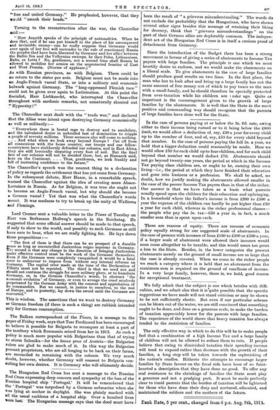In the case of persons paying at or below the
3s. ed. rate, owing either to their income being earned or to it being below the £800 limit, we would allow a deduction of, say, £30 a year for every child up to the number of four, and of, say, £50 for every child beyond that number. In the case of persons paying the full 5s. a year, we hold that a bigger deduction could reasonably be made. Here we would allow £50 for each child up to four children, and for each child beyond that number we would deduct £70. Abatements should not go beyond twenty-one years, the period at which in the Income Tax paying class children are, or ought to be, earning their own living—i.e., the period at which they have finished their education and gone into business or a profession. We shall be asked, no doubt, how we justify making the abatements allowed smaller in the case of the poorer Income Tax payers than in that of the richer. Our answer is that we have taken as a basis what parents usually spend upon the children for their education and upbringing. In a household where the father's income is from £200 to £500 a year the expense of the children can hardly be put higher than £30 a year for each child, whereas in the richer professional classes— the people who pay the 5s. tax—£50 a year is, in fact, a much smaller sum than is spent upon each.






























 Previous page
Previous page